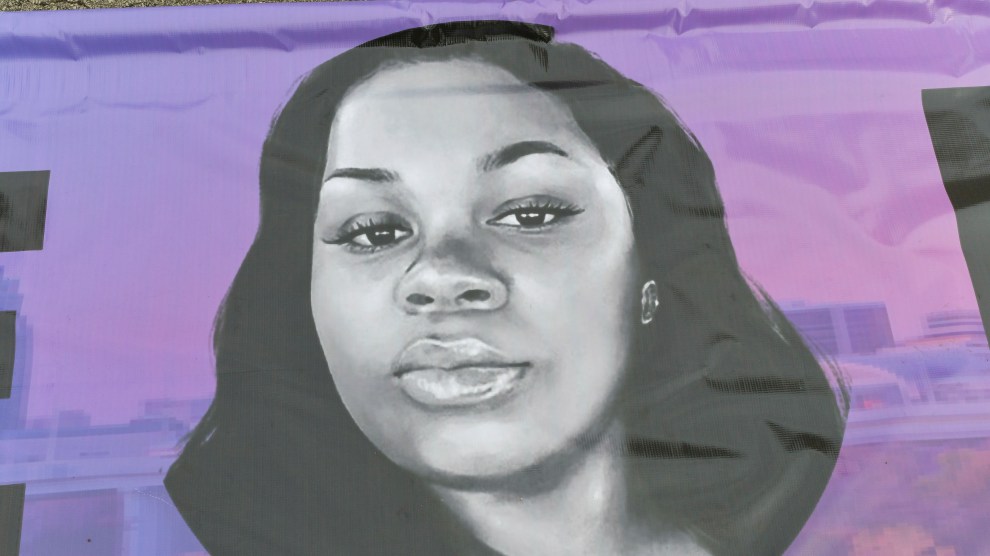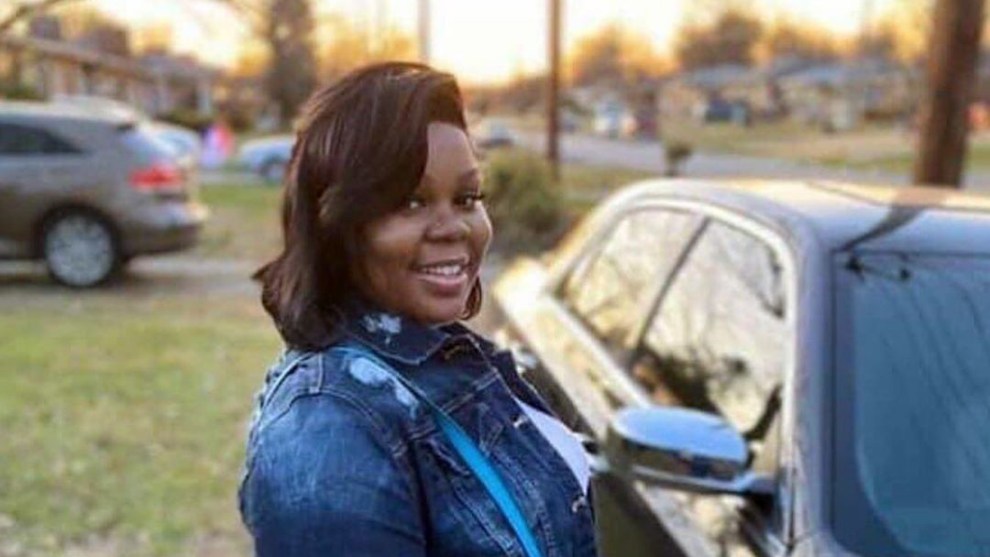
A mural portrait of Breonna Taylor Julio Cortez/AP
More than four years after Kentucky police barged into Breonna Taylor’s home in the middle of the night and shot her to death, her family is still fighting for justice. And this week, a federal judge dealt them a major blow.
On Thursday, US District Judge Charles Simpson, a Ronald Reagan appointee, dismissed felony charges against two of the former Louisville officers involved in the police raid that led to Taylor’s death. Instead, the judge ruled that Taylor’s boyfriend was legally responsible for her death. The officers still face other charges.
Former Detective Joshua Jaynes and former Sgt. Kyle Meany were not present at the raid on Taylor’s home in March 2020, but they allegedly lied to obtain a warrant for other officers to enter in search of drugs. Taylor, a Black 26-year-old medical worker, had fallen asleep watching the movie Freedom Writers when, a little after midnight, seven plainclothes police barged through her door. Her boyfriend, Kenneth Walker, thinking the officers were intruders, fired a single shot, and the officers returned with a barrage of bullets that struck Taylor. As she lay wounded, Walker called 911, still not realizing it was the police who had attacked them.
In 2022 the Justice Department filed civil rights charges against four current and former officers who were involved in her death, including Jaynes and Meany. Not long afterward I was writing a profile of Taylor’s aunt, Bianca Austin, who told me that the family felt relieved about the prosecutions. “I was just so happy,” Austin said of the indictments. “I’m just grateful the DOJ decided to do their job, that somebody decided to step up and say, ‘This is not right.'”
Within a few weeks of the charges, one of the four officers, Kelly Goodlett, pleaded guilty. Goodlett said she and her colleagues lied to obtain the warrant by claiming to have evidence they didn’t have. More specifically, she said she did not stop Jaynes when he falsely claimed to have proof that a drug dealer was sending packages to Taylor’s apartment. According to prosecutors, the warrant application also stated that the dealer used Taylor’s address as his own, even though the detectives knew the dealer did not live there. No drugs were found on the premises.
The lies allegedly continued later. News of Taylor’s death sparked widespread outrage. Thousands protested. As public backlash grew, according to prosecutors, Goodlett and Jaynes met in Jaynes’ garage to scheme how they could cover up the false statements they had made. And according to prosecutors, Meany allegedly lied to the FBI.
The two cops who actually shot Taylor—Jonathan Mattingly and Myles Cosgrove—were never charged. Prosecutors said they did not know their colleagues had lied to obtain the warrant. Instead, the Justice Department blamed the four other officers for Taylor’s death. But on Thursday, Judge Simpson disagreed. “While the indictment alleges that Jaynes and Meany set off a series of events that ended in Taylor’s death, it also alleges that [Taylor’s boyfriend, Walker] disrupted those events when he decided to open fire” on the police, Simpson wrote. Walker’s “decision to open fire,” he added, “is the legal cause of her death.”
The ruling effectively reduced some of the felony charges against Jaynes and Meany, which had carried a maximum sentence of life in prison, to misdemeanors. But officers are not totally off the hook: The judge refused to dismiss a charge against Jaynes for conspiracy and a charge against Meany for lying to the FBI. Goodlett, who pleaded guilty to federal charges, is expected to testify against them at their trials. A fourth former officer, Brett Hankison, also faces a retrial for federal charges in October.
Taylor’s family said prosecutors plan to appeal this week’s ruling. “Obviously we are devastated,” the family wrote in a statement to the Associated Press. “The only thing we can do at this point is continue to be patient…we will continue to fight until we get full justice for Breonna Taylor.”
















